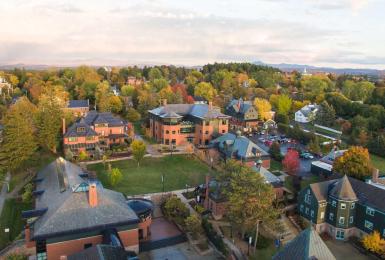Face-to-Face and Online Learning Both Ranked High for Quality; Online Learning Believed To Be Better for Post-Traditional Learners
A new survey from Champlain College Online says that while most adults see the value in higher education to prepare them for advancement in the workplace, ongoing concerns over incurring student debt and affordability are the major barriers to returning to school to complete a certificate, associate degree or bachelor's degree.
The Adult Viewpoints 2017: Online Learning and the Back-to-School Decision Survey, conducted by Full Circle Research - a national market research firm - reveals significant new findings on how U.S. adults ages 23 to 55 perceive the value of higher education, the barriers and motivators for them to return to school, and the quality of online learning.
Of those surveyed, 70 percent assigned an "A" or "B" to the overall success of higher education in preparing adult students for the workplace. Six out of ten respondents said they have personally considered returning to school to complete a certificate, associate degree, or bachelor's degree. The two main barriers cited among all respondents to going back to school were concerns about being "burdened with student loan debt" (75 percent) and "inability to afford it" (70 percent).
"According to recent estimates from the American Council on Education, the number of post-traditional students has grown to 13.3 million, comprising 60 percent of all undergraduate students, yet they are still underserved by higher education," said Donald J. Laackman, president of Champlain College. "We commissioned this survey to respond to the needs of the adult learners that make up a significant portion of our workforce, and to hear their diverse voices."
Defining Quality Higher Education for Post-Traditional Students
Adult learners appear conflicted when it comes to the quality of higher education, specifically online education. Nearly two-thirds of all respondents believe the overall quality of online education to be "excellent" or "very good." Respondents perceive face-to-face learning as preferable to online learning in most respects, but recognize that access to a quality education online can be ensured through practices supported by research on teaching and learning effectiveness.
More specifically, regarding quality, the survey found:
- More respondents judge online learning (38 percent) as better than face-to-face learning (26 percent) in meeting the needs of adult students.
- More than three quarters (76 percent) of those who have considered going back to school judge the quality of online learning to be excellent or very good.
- Students feel better about the concept of online learning when presented with attributes relating to quality, such as small class sizes and instructors who are industry experts.
The Hope Gap: Overcoming Accessibility Barriers to Gratifying Careers
"Champlain College Online's survey reveals that many adults would go back to school with the hope that higher education will unlock greater opportunities and gratifying careers for them, but barriers range from self-doubt to financial and physical realities," said Dr. Laurie Quinn, provost and senior vice president for academics at Champlain College. "More awareness and action can close this gap, so adults have access to the quality, affordable education they deserve."
The survey revealed that 59 percent of respondents would have a more positive feeling about themselves if they complete a degree. Most adults cite financial considerations as the main reason they cannot return to college, but money also serves as the prime motivator to return: a whopping 73 percent of respondents want to increase their earning potential. Additionally, the survey found:
- Seven out of ten (70 percent) respondents believe it is "very important" or "somewhat important" to hold a bachelor's degree to secure a job in the future.
- More than seven out of 10 (72 percent) adults who have considered going back to school have completed some college or hold an associate degree.
- Black/Non-Hispanic respondents (78 percent) and Caucasian/Hispanic respondents (74 percent) are significantly more likely than Caucasian/Non-Hispanic respondents (55 percent) to have considered going back to school.
Champlain College Online commissioned Full Circle Research to field this online survey from November 17-20, 2017 with a nationally representative sample of U.S. adults between the ages of 23 and 55. Full Circle Research is the first and only online sample provider to be ISO 26362-certified, a global designation of quality. All respondents were screened to include only those who have a high school degree or GED, some college but no degree, or an associate degree. Data was compiled and analyzed during the fourth quarter of the 2017 calendar year. The margin of error (for the entire sample of 1,004 respondents from all 50 U.S. states and the District of Columbia) is +/- 3.1 percent with a confidence level of 95 percent, and smaller for subsets.
You May Also Like
Request Information
Connect with our admissions team to learn more about Champlain College Online.

Request Information
I acknowledge that, by clicking the "submit" button, I am giving my express written consent to Champlain College and its representatives to contact me about educational opportunities via email, text, or phone, at the phone number above, including my mobile phone, using an automatic dialer, or pre-recorded message. Message and data rates may apply. I understand that my consent is not a requirement for enrollment, and I may withdraw my consent at any time.




